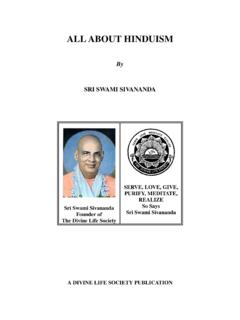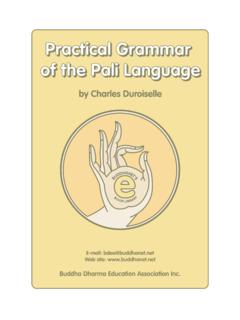Transcription of Lived religion The praxis of practical theology
1 Ganzevoort & Roeland, Lived religion : the praxis of practical theology . Internation Journal of practical theology 18(1), 2014, 91-101 Ganzevoort & Roeland Lived religion The praxis of practical theology R. Ruard Ganzevoort & Johan H. Roeland International Journal of practical theology 18(1), 2014, 91-101. Summary Taking the case of spiritual gardening as a starting point, this paper reflects on praxis as the object of practical theology . praxis is understood as the domain of Lived religion and focuses on what people do rather than on official institutionalized religious traditions. praxis refers to fields of practices like care or community building and to the patterned configurations of action, experience, and meaning. In pluralized, secularized, and deinstitutionalized contexts, these fields should not be limited to explicitly religious or specifically Christian domains but include the broader field of spiritual and existential practices.
2 Three practical theological perspectives in studying Lived religion can be distinguished: pastoral/ecclesial theology , empirical theology , and critical theology . In all three perspectives practical theology is a form of concerned engaged scholarship. Zusammenfassung Den Ausgangspunkt dieses Artikel bildet das Beispiel des spiritual gardening , von dem aus die Bedeutung der praxis als Gegenstand der praktischen Theologie reflektiert wird. praxis wird dabei aufgefasst als Dom ne der gelebten Theologie und konzentriert sich auf das Handeln von Menschen im Gegensatz zu offiziellen institutionalisierten religi sen Traditionen. praxis bezieht sich in diesem Sinne auf T tigkeitsbereiche wie F rsorge oder Gemeindebildung und auf das strukturelle Muster von Handlungen, Erfahrungen und Sinngebung.
3 In pluralisierten, s kularisierten und entinstitutionalisierten Kontexten sollten diese Bereiche nicht auf explizit religi se oder ausdr cklich christliche Gebiete begrenzt warden, sondern sollten auch das weitere Feld der spirituellen und existentiellen T tigkeitsbereiche mit einbeziehen. Drei praktisch theologische Perspektiven k nnen im Studium der gelebten religion unterschieden werden: pastoral/kirchliche Theologie, empirische Theologie und kritische Theologie. Ganzevoort & Roeland, Lived religion : the praxis of practical theology . Internation Journal of practical theology 18(1), 2014, 91-101 Ganzevoort & Roeland Innerhalb all dieser Perspektiven beschreibt der Artikel die praktische Theologie als eine Form der engagierten Wissenschaft.
4 Introduction Maria is a 50-year old woman, living in a small village in the Netherlands. A few years ago, she quit her job as a secretary, as she found the workload too heavy and the modern, professional environment increasingly difficult to negotiate. Since then she volunteers in a hospice. One year ago, Maria engaged in a new hobby that she had been aspiring to for years: gardening. Together with a friend, she started cultivating a small allotment. To her own surprise, gardening became a spiritual activity for Maria. Having worked in her garden all year long, and having witnessed nature in spring, summer, autumn and winter, she became aware of cycles of nature, the beginning, spring, turning point and decline , as she described during an interview.
5 Humankind , she added, has lost attention for the turning point and the decline of life. We only want birth, youth and beauty, but we close our eyes to decline. Decline causes anxiety. We frenetically hang on to youth and beauty and deny other phases of life. Through gardening, I learned to accept and appreciate the cycles. Appreciating them brings acceptance, satisfaction, and peace. Looking at what is, not at what should be. For Maria, gardening is much more than a hobby. It is an existential and spiritual activity that helps her, as she said, accept my own mortality . There seems to be a connection between her volunteer work in the hospice and the meaning she finds in gardening. It makes sense to interpret the language she uses as analogous to the circular metaphors in the feminist theology of flourishing as proposed by Jantzen (1995) as critique of and complement to male dominated metaphors of linear progress.
6 We can even describe gardening as a devotional activity, built on the importance of performative practice, skillful effort, repetition and results (Jenkins 2013). One could add that essential to gardening is the fact that our efforts facilitate the outcomes, but don t define it. Rather, our performance sets the stage for receiving life as a gift. Apparently, gardening can take on these profound and theological meanings and therefore it may function as an illustrative casus for the question we address in this article: what is the object of study of practical theology ? In what sense would practices such as gardening be relevant for practical theology ? We discuss four issues related to the role of praxis in practical theology : the concept of praxis as the object of study; the concept of Lived religion as its domain; the methodology required to study this praxis ; and the concerned and engaged involvement of the researcher in the praxis studied.
7 Ganzevoort & Roeland, Lived religion : the praxis of practical theology . Internation Journal of practical theology 18(1), 2014, 91-101 Ganzevoort & Roeland The concept of praxis It is widely acknowledged that practical theology has praxis as its object of study and reflection. However, what praxis means and what it refers to, is far from evident. We argue that the notion of praxis emphasizes one particular dimension of religion : the dimension of action or somewhat broader the ways in which religion is Lived . Aristotle s concept of praxis ( ), rediscovered and redefined by Arendt (1958), MacIntyre (1981), and others, is one of the founding notions of action in practical theology s history (van der Ven 2005; Forrester 2000; Gr b 2000; Smith 2012). For Aristotle, discussing the notion of praxis in the context of ethics, it referred to the domain of acting and doing, as opposed to abstract, theoretical knowledge.
8 According to Aristotle, ethics is not a theoretical endeavor, but a practical one: morality is a quality of acting and doing, instead of thinking, contemplation and theorizing. Ethics, in other words, is about the way people act in moral respect. Moreover, for Aristotle, praxis is distinguished from poiesis by the fact that the aims or ends of praxis are internal to the actions itself, whereas the aims or ends of poiesis are external. Although MacIntyre critiques this distinction (especially the suggestion of external aims in poiesis), Aristotle s is a profound understanding of the more than instrumental nature of praxis . The concepts of praxis and Lived religion focus on what people do rather than on official religion , its sacred sources, its institutes, and its doctrines.
9 As such, practical theology has much in common with what in disciplines like anthropology, sociology, and media studies, is known as the practical turn : the turn away from institutes and (cultural) texts to the everyday social and cultural practices of ordinary people. In media studies for example, Couldry (2012, 35) pleads for a discipline that refers not to media as objects, texts, apparatuses of perception or production processes, but to what people are doing in relation to media in the contexts in which they act . In sociology and anthropology, scholars like Bourdieu (1977) used the notion of practice to refer to the human capacity for invention, rebellion, distancing and improvisation with respect to the broader social en cultural order, thus recognizing human agency.
10 In the sociology of religion , the notion of practice is used to refer to the everyday, Lived religion of ordinary people, as opposed to formal, institutionalized religion , thus criticizing an influential bias in this discipline. As Berger argues in his foreword to Ammerman s (2007, v) Everyday religion : Much of the sociology of religion has dealt either with (..) institutions that is, broadly speaking, with the internal conditions and the societal role of churches or with survey data covering the beliefs and behavior of large populations. Obviously, both procedures have yielded important insights. But what both have in common is remoteness from much of what constitutes the reality of religion in the lives of many people.





